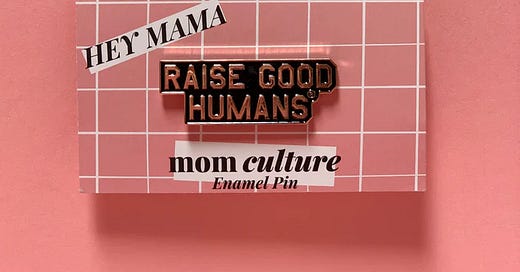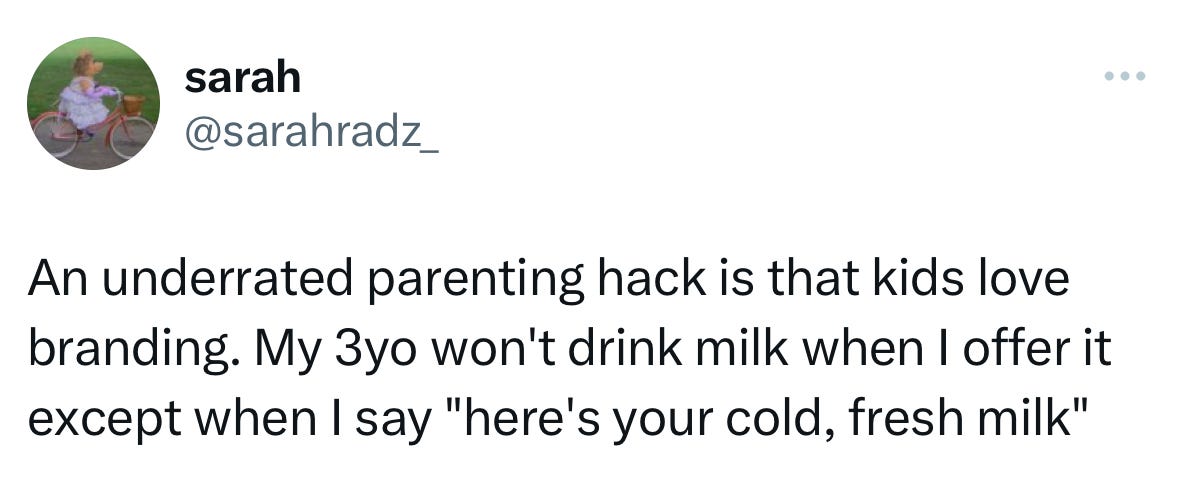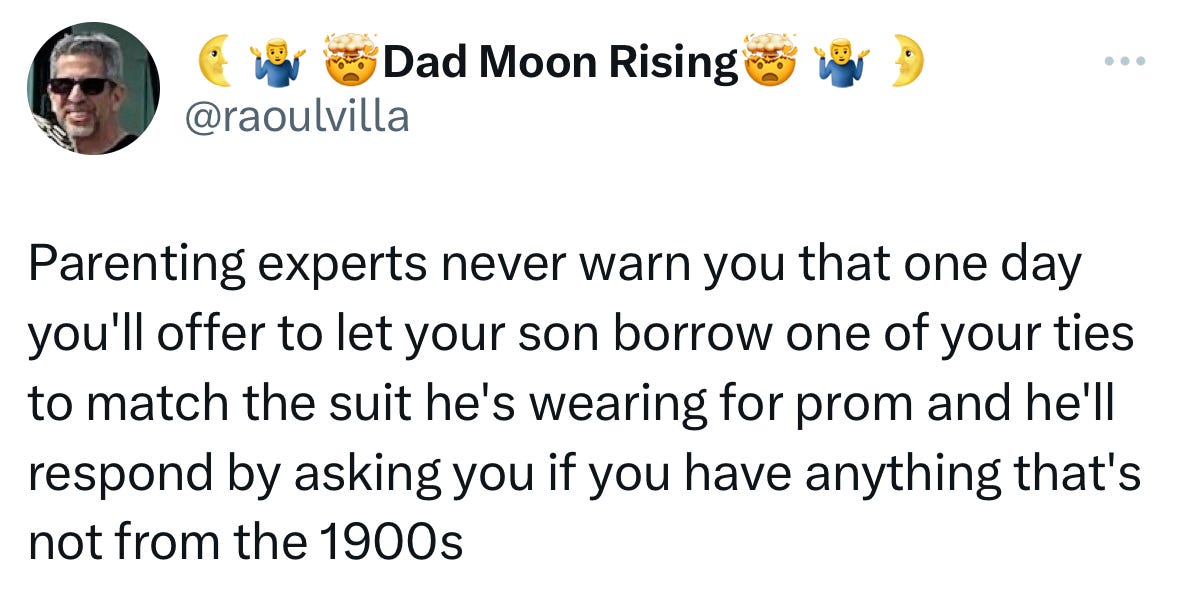The Point of Parenting
“There are only two lasting bequeaths we can hope to give our children. One of these is roots, the other is wings.”
“There are only two lasting bequeaths we can hope to give our children. One of these is roots, the other is wings.”
— Johann Wolfgang von Goethe
Why are you here?
No, I’m not asking the big existential question, forcing you to wonder why you are alive on this rock spinning around the sun at 67,000 mph. That’s a lot for a Friday and a little out of scope for this newsletter (at least for today).
But why are you here, reading this newsletter, right now? And the pertinent question behind the question: Why did you have kids? You may have arrived on Planet Parenthood by choice. You may have been dragged, kicking and screaming, towards the maternity ward against your will. You may have arrived here by chance, becoming a parent through matters of circumstance.
However you ended up in this wild world of raising children, you’ll have wondered what life means now. The first time you held your child to your chest, breathing in tandem as you marvelled at how the entire universe seemed to have shifted from a broad, all-encompassing perspective to a tight focus, wondering how you can provide and protect those in your immediate orbit. Over my ten years of parenting, I’ve wondered more about who I am and why I’m here than during the three decades that preceded it. It’s been tough, messy work. In the dark night of the soul, listening to a screaming child who won’t settle, I’ve questioned my very core. What I’ve excavated down in these caves has been enlightening and terrifying in equal measure.
“Why am I here?” might not be a question as old as time, but it goes back long enough. We can trace it through the works of Camus, Nietzsche and Kierkegaard, back to the streets of Athens as Aristotle and Plato questioned the nature of being. "The unexamined life is not worth living,” their great teacher Socrates suggested. So, let’s attempt to examine the life of a parent.
Stop me if you’ve heard this one before. I turned 40 last year. And it was fine, I’m happy about it, I really am. I’m fine. (I am aware that reads exactly like I am not.) Those big decade birthdays, the rolling over of the odometer ones, the ones that make you wonder, “Hmmmm, I can’t be that age, that’s the age my dad was…” Well, they provide an opportunity for reflection and taking stock.
The average life expectancy for a man in the US is 74.5 years old. In the UK, it is 79.5, and only a shade better here in Spain at 79.7. By median estimates, I am past the halfway point of my life. I find myself in the middle, something on my mind when rolling up to the big 4-0:
The middle gets a bad rap—lost in the middle of nowhere, their middle-of-the-road album, being stuck in the middle, giving the middle finger. But the middle is where life happens. It’s where you make the decision, consciously or not, on the type of parent you’ll be, and how your kids will remember you when they’re approaching a middle of their own. When was the last time you lost your shit at your kids? Were you “JUST IN THE MIDDLE OF SOMETHING!?” You’re always in the middle of something. We all are. There’s never the right time. There’s just the middle.
But there’s joy in the middle. It provides a chance to take stock of where you are on your journey and make necessary changes. Are you still heading in the right direction? Is a course correction required? Or is another endpoint more interesting, fulfilling or desirable? It’s free from the heavy weight of expectation that encumbers beginnings; unlike dreaded endings, the middle is light on regret and remains pregnant with possibility. The middle is a place to breathe, think, live, and do. Stopping in the middle is a radical act—to forcibly career onto an immediate off-ramp, finish line be damned; a fearless leap off the treadmill, trusting the emergency cord to deal with the repercussions. When you stop at the end, it’s too late. You’re already there. Ceasing in the middle unlocks magic.
There has to be a point to parenting. Because it sure as hell isn’t a fast-track to euphoria. Research has repeatedly found that having children decreases levels of happiness and satisfaction with your marriage, hammers your disposable income and makes a good night’s rest a thing of the past. And praise be that you’re a man! Women see their bodies undergo a transformation before, during and after childbirth, with repercussions that remain long afterwards. The upside? A 2013 study found that while satisfying your immediate needs and wants leads to increased happiness, it is “largely irrelevant” to living a meaningful life. The same study found that a more meaningful life also means signing up for higher levels of worry, stress, and anxiety.
And what is raising children if not that? Because whilst children make the day-to-day of life harder, they enable us to expand the aperture of our emotional range. I’m sure you’ve heard, if not uttered yourself, “The highs are higher and the lows are lower” since becoming a parent. And whilst the highs aren’t exactly as high as those I experienced in the dark, sweaty nightclubs of my 20s, becoming a dad opened my empathy valve and taught me to feel things in a way I hadn’t experienced before.
This shifting of the status quo is especially important for fathers—men who may have grown up in circumstances where they weren’t encouraged or allowed to show their true feelings. As much as modern masculinity is changing, this isn’t a world we’ve entirely left behind: I remember a boy in my daughter’s nursery class who fell over, ripped his knee open, was bleeding everywhere, and maintained a stoic, straight face throughout. When the teacher asked him why he wasn’t upset, he said, “My dad told me boys don’t cry.”
Raising children brings a sense of purpose to life, elevating it beyond the daily humdrum. That feeling as you watch your child overcome an obstacle—literal or metaphorical, a chair they climb or a social situation they navigate—using the tools and techniques you’ve imparted to them is hard to beat. But our kids can’t be the only place we seek to fill the purpose bucket. We’ve all watched friends allow their entire sense of self to fade into the background as the role of “parent” becomes all-encompassing, as they disappear into the part like Daniel Day-Lewis. Meaning is waiting to be found wherever you look. We do our children a great disservice when we pin our entire reason for existing upon them.
Becoming a parent means accepting your arrival in the middle of your life as you spend your days watching another start theirs. Grab the tissues—we’re deep in “Circle of Life” territory here. It’s a forcing function in man’s search for meaning: now I have become the giver of life, what is my role as a human being? Raising children turns a vague outline of “legacy” into a walking, talking, tiny human being. What else will you leave behind, if not your children?
If we’re searching for the point of parenting, what might the answer be? “Raise Good Humans” always felt like a fantastic rallying cry. You may have heard this from author Hunter Clarke-Fields or podcaster Dr Aliza Pressman. Since the day I saw this badge, those three words haven’t been far from my side.
How might we raise good humans? What does this mean in a world where their future is more uncertain than ever? Not to get all Whitney on you, but I believe the children are our future—as fellow dad and sustainability expert Andrew Wanliss-Orlebar suggested on these very pages last year:
If my career has taught me anything, it’s that having kids may well be exactly what we need to save ourselves. I have faced countless CEOs who confessed to their own precious child looking them dead in the eye, inquiring, “Daddy, why are you killing our planet with your business?” This was the catalyst to convert them from distracted denial to dedicated action.
In 2019, Mohammed Barkindo, the secretary general of OPEC—the organisation representing 80% of the world’s oil reserves—stated that "young activists are the greatest threat to our industry going forward.” Those children that are stressing us out so much? They might end up saving us from ourselves. This thought was echoed by writer Charles Eisenstein earlier in the year in his essay “On Bringing a Child into the World, as he reflected on being told he “owed everyone in this [conference room] an apology for selfishly having four children who will consume resources for the next 90 years:”
When you don't understand what the purpose of a human being is, then it looks like we're just a burden on the planet. But actually, the purpose of a human being is to contribute to life and beauty on Earth, and its further unfoldment, which is what all species are here to do. I see my children as my gift to the future.
They will be a boon to this planet, they will contribute to life and beauty. Because they're not here to have it easy, they're not here to enjoy a perfect world. And this one is so imperfect that we wouldn't want to bring them into it. They're here with hard task, a heroic task, and not in the sense of the hero's journey hero, but heroic in the sense that you might not even ever get applauded for it, or celebrated for it. Because a lot of what needs to be done is so quiet and humble. Anybody who has children who is able to impart the next stage of the realization of that purpose is giving a gift to the future.
I have this have this vision of humanity in a pit. […] We're trying to get out. Eventually, we realize that the only way out is to make a human tower. Some people, instead of trying to climb up onto others, they hunker down by the edge of the wall, and the next generation climbs onto their shoulders, and the next one climbs onto their shoulders, up and up and up. It’s also like a race, a long distance relay race. You go as far as you can, you're exhausted, you stagger and fall. But you push your child out ahead of you, and they run the next leg. You hold your child up, and you become old, and you become become frail, and you can't do anything anymore, you can't create much anymore. And your last act of pushing somebody up to the next level of a wall is maybe reading stories to a three year old, when you're in your rocking chair. You can still do that, and infuse a little bit of love into them, so that they can be stronger in their climb. And someday they reach a certain point, and can go no farther. But there's the next generation and the next and we push each other up the wall.
When we were discussing this essay in our community earlier in the year, Ivor, who pens the Mortals newsletter, suggested that “Raising a child in the Anthropocene—when everyone is losing their shit—is, in fact, the most punk thing you can do. A proper rebellion against the misery seekers and doomers.” Raising kids is the most punk thing you can do. That has a certain ring to it.
So, why am I here? Well, in 17 minutes I’ll close this laptop and go pick my kids up from school. I’ll take them to their boxing class, come home, rustle up some tacos and soak them in the bath. Then I’ll cosy up on the bottom bunk with my son and read him a story while he makes his way towards the land of nod. I’ve spent the last decade reorienting my life away from distractions I once thought of as meaningful—grandiose sounding job titles, definitions of success promoted and perpetuated by others, the never-ending pursuit of more—and towards a life where I can be more present: both for myself and my kids. Maybe the point of all of this is to be able to look back on a life well lived. And I can’t imagine a life lived better than this.
To live a fulfilled life, we need to keep creating the "what is next", of our lives. Without dreams and goals there is no living, only merely existing, and that is not why we are here.
— Mark Twain
3 things to read this week
“The Parents Who Regret Having Children” by R. O. Kwon in Time. In my discussion with writer Daniel Pink back in 2022, he shared that fewer than 20 participants in his 20,000-strong regret survey said they regretted having children. A recent study found the number might not be ~0.1% but as high as 14%. This piece explores one of the most forbidden thoughts of a parent—what would my life be like if I had decided not to have kids? “If she could inhabit the person she was before she became a parent? ‘I would have stopped that pregnancy before it happened.’ But that’s the part Helen’s never said to her daughters, who, after all, didn’t ask to be born. She’s hell-bent on raising them well, not taking out any regrets on the girls. ‘I love them. I just don't love the choice I made.’”
“Honey, I Love You. Didn’t You See My Slack About It?” by Erin Griffith in The New York Times. ”Relationships are work, but no one wants to admit it,” opens this NYT article, talking to couples using project management software to keep on top of their personal lives. This didn’t seem all too strange to me, and honestly—if you’re not rocking at least a shared Google Calendar for your family, then you’re making life harder than it needs to be. This is probably as good a place as any to plug The Expectant Dad Operating System (TedOS), the Notion-based tool I developed last year to help expectant parents deal with the onslaught of things to learn, buy and do before the birth of their little one.1
“The Rise and Fall of the Trad Wife” by Sophie Elmhirst in The New Yorker. From families using future-facing tools to those looking back to the past. The “trad wife” trend, popularised on social media over the last few years, follows women who have left career paths behind in order to cook, clean, and keep house, a movement that seems to have been co-opted by the Conservative right in the US as a new battleground in the never-ending culture war. “Young women continued to follow their deftly curated social-media fantasy, lured, perhaps, by the hustle of the anti-hustle, the opt-out from job dissatisfaction and economic insecurity, or tempted by the promise of a single, coherent identity gathered around a distant, simpler time.”
Good Dadvice
What About You?
And now, I’d love to hear from you on the point of parenting. What was your thinking behind becoming a parent? How has it changed you and your perspective? And how has it added to—or maybe detracted from—the important things in your life?
Say Hello
How did you like this week’s issue? A little later than usual. I was wrapping my head around an existential crisis that I have now hopefully passed to you. Enjoy!
Loved | Great | OK | Meh | Bad
Branding by Selman Design. Survey by Sprig. The New Fatherhood is ad-free and entirely reader-supported. Become a subscriber, gift TedOS to an expectant father friend, or talk about life, career, and your own search for meaning.
This week I took one of your annual subscriptions and bought a NYT subscription with it. Now I can share full article links everyone can read! Unlocking the commons in full effect—just one of the many ways I’m using your subscriptions for the greater good. Help keep the good times rolling.










My thinking behind becoming a parent?
In hindsight I gave zero thought to not being a parent. Or even about whether to have kids or not? Just a desire within to have children, regardless of the consequences I guess.
It wasn't a case of whether to have children, more a challenge of finding someone to have them with me! :)
What has it detracted from? I genuinely don't think it's detracted from anything. Sure there are ups and downs but these are human beings I've helped create that love me as much as I love them (I think!).
What has it added to? Absolutely every aspect of my life.
Planet Parenthood sounds awfully like something else.
You may enjoy my piece on Minecraft addiction: https://ishayirashashem.substack.com/p/parenting-cute-little-minecraft-addicts